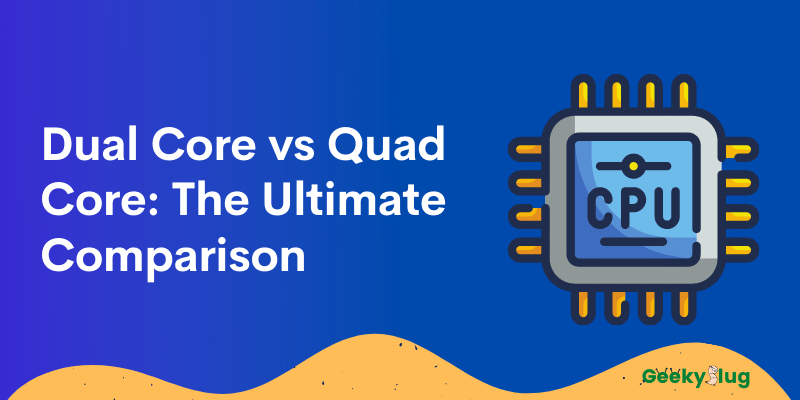Dual Core vs Quad Core: The Ultimate Comparison

Geekyslug is supported by its readers. We independently analyze, test, review, and recommend the latest tech products—learn more about our process. When you buy something through our links, we may earn a commission.
A core in a CPU is a processor. The more the cores, the more the processor inside the CPU. For example, up until the Intel Pentium D series, the CPUs used to have a single processor inside them, but since the development in technology never stops, they moved further on to build more complex architectures and designs for better performance and whatnot.
As the image above shows the 4 cores of a CPU, we can understand how the design and architecture of a CPU work when we are talking about its cores.
Every individual core works as a separate processor for tasks. Now those tasks can be singular, or multiple, what does adding an extra core does to the CPU? It simply makes it easier and faster for the computer to handle.
Differences
Since there are even higher cores available in the market now, up to 64 Cores coming from AMD Ryzen Threadripper! We can easily understand what the differences are going to be, and why they are like that. Talking about, what is the difference between quad core vs dual core? Well, the thing is, there isn’t just one.
So to start, these are our points for comparison between dual core vs quad core processors, for which is better.
- Literal Difference
- Performance
- Power/Heat
- Cost
- Availability
So here are the differences explained.
Literal Difference
As the terms dual core and quad-core say themselves, a dual core processor like Intel Core 2 Duo, AMD Athlon X2, contains Two Cores in their CPU. While a quad core processor likes Intel i7 4th Gen or AMD Ryzen 5.
Since the major difference between a dual core CPU and a quad core CPU is that only of Two extra cores in the quad core CPU, it does make a lot of difference.
Performance
As we are having two more processors in a quad core CPU than a dual core, we will have some obvious certain advantages. But what will they be, and why? Let us see how.
A core of a CPU is an individual task-performing unit. To make it easier to understand, let us take an example of traffic.
Consider we have 100 people to transport from one point A to another point B. For this, our option is to use Buses. Now, our buses have only the capacity of 25 people at one time. So to solve this problem, we can send 25 people in 4 turns using a single bus, this will be our symbolism for a single-core CPU.
Another thing we can do is get another bus. Now let’s say we have two buses, now we can send 50 people at one time, so to say it will now only take us 2 turns to transport all the people. This is how we can consider the working of a dual core CPU as compared to a single core CPU.
More cores in a CPU enable us to shift/distribute our tasks into multiple lanes/processors to make it easier, faster for our computer to handle.
Similarly, a quad core processor, having the capability of sending 4 buses at one instance, will make our task even easier and faster, as it will transport all the 100 people in one go.
Traffic can be interpreted as our task in the computer, for example, multiple large inputs, copying data, or scientific calculations, etc
The buses can be an interpretation of the cores in a CPU, the more the cores the more work it can manage.
So in the end, a quad core CPU against a dual core CPU of the same segment will have marginally better performance.
Power/Heat
This is a very simple understanding as the more the work done, the more power is needed, and so more will be the heat dispersed.
Still, we can take the case of our buses here.
A dual core CPU, or two buses, will require less fuel (electricity) than a quad core CPU, which is using 4 buses. At the same time, since the work is heavy in a quad core processor, there will definitely be more heat released from the CPU, therefore heat sinks are always coming with them.
Cost
Like some wise man must have said, “one who thinks of the future, conquers the present”, technology has been the future for a long time, and it will be too. Since every little development of technology requires immense hard work, dedication, monetary funding, and research, it definitely gets costly.
The price of the processors has seen a lot of variations, as well they have witnessed the improvement. With better technology, we have processors today that can cost well over $1000, which can sometimes be the cost of a whole computer system of much lesser performance build.
To get on a more basic level, you can get average dual and quad core processors around 120-150 USD. But since there has been a huge market of many powerful devices out there, these prices can be inefficient as compared to what some of the higher performance CPUs can be available at much lesser or similar prices.
As you can see some of the most high-end CPUs which have exponentially more power and performance than the average dual core CPU or quad core CPU, do not have that much higher cost. This suggests that due to structure, better-performing processors are available at much lesser prices.
Availability
Learning about the releases and high demand of much powerful and efficient CPUs in the market has made the usual dual core CPU outdated. Since the performance difference between dual core CPUs is very high, quad core CPUs are still available in markets and can be bought online or offline.
What is better and how?
So far it can be clearly seen that between two average, similarly priced dual core CPUs and quad core CPUs, a quad core CPU will always perform better.
Yet it can be noted that a high-end dual core CPU might slightly perform better than a very low-end quad core CPU, but it still will lack the most important aspect of multi-tasking, since multi-tasking is solely based on more cores of the CPU.
So before we conclude, let us look at the aspects which the better performance in quad core shows and how they matter.
Internet Browsing
Since internet browsing requires not much more than a decent CPU and RAM. Since a dual core CPU can easily handle somewhat more than that, this won’t be a concern for us.
Multimedia
Watching movies, playing light low-end games, while listening to music, are some minor tasks that a computer built with an average dual core CPU can manage, so for your most basic demands, this should not become a problem. If there is a low-end GPU fit into your device like the old GT 610, it can handle up to normal 1080p watching.
Graphics/Video Editing
Graphics designing and video editing, rendering heavy and high-quality videos demand better graphics capabilities, even if we equip ourselves with any high-end graphic cards like RTX 3080, it will get bottlenecked by a substantially low-powered CPU.
To match the power of high-end GPUs for heavy graphics-oriented works like using 3DSMax, Unreal Engine, or Adobe Photoshop, we need a superior CPU, therefore our usual dual-core CPUs will not be giving us the juice we need to power our work.
Music Studio
Music studios have come a long way from what they used to be. Nowadays we have so many DAW softwares (Digital Audio Workstation) that we can make studio-grade music just at our home. But also these softwares have the requirements of a good computer as they suck up a lot of resources while working.
So a good medium-ranged build with any mid-high ranged quad core CPU will work up fine enough, but sometimes the professionals do prefer high-end builds, because why not, they prefer that for everything.
Gaming/Streaming
In terms of professional gaming, or even mid-range gaming, the builds require a lot of power to run the latest generation games or AAA titles, some, for example, Resident Evil 8 Village, Cyberpunk 2077, Red Dead Redemption, etc.
The requirements to build a computer capable of handling these are quite high, even if you get a quad core CPU, it has to be a mid-range minimum to make sure it does not mess with your framerate.
For people looking forward to streaming your content on the internet, the requirements rise up a little bit more as now you not only have to be having a desktop capable enough to run, but also to manage the streaming softwares like OBS studio.
FAQ
Should we go for dual-core processors if our budget is low?
Well, it is not advised since nowadays a quad can be managed into minimal builds with quite less costing CPUs, unless you do not have more work than internet surfing and usual entertainment.. Do not expect your computer to handle much load with a dual-core processor like heavy gaming, 3d rendering, graphics designing etc.
Conclusion
So this was our easy-to-go, detailed guide of comparison between dual and quad core CPUs. So if you were wondering which is better, a dual-core processor or a quad core processor for your computer, this guide will be helpful.

By Sam Rhodes
Hi, I’m Sam Rhodes, a passionate tech reviewer, and gamer. I started Geekyslug with the motive of sharing my knowledge about tech gadgets like gaming laptops, tablets, graphic cards, keyboards, and whatnot.
I also share troubleshooting guides, helping people resolve issues with their gadgets. When I’m not writing, I prefer playing Valorant, Call of duty, GTA5 or outdoor activities like skateboarding and off-roading on my bike.






